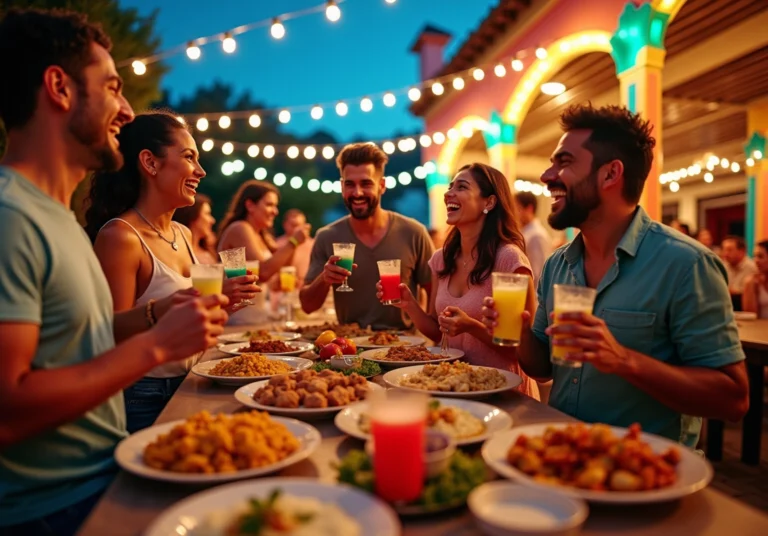Overview
This article dives into ten humorous Puerto Rican phrases that beautifully reflect the island’s unique cultural humor and values. Each phrase highlights a special aspect of Puerto Rican life—think the joy of communal meals, the importance of family, and that ever-celebratory spirit! It’s fascinating how language acts as a vibrant expression of cultural identity and social connection, isn’t it? You’ll find that these phrases not only entertain but also invite you to discover the heart and soul of Puerto Rican culture.
Key Highlights:
- ‘Wepa’ is an exclamation of joy and excitement, commonly used during celebrations.
- ‘¡Ay, Dios Mío!’ expresses surprise or disbelief, often accompanied by dramatic gestures.
- ‘Comer es un placer’ reflects the cultural importance of communal meals and shared heritage in Puerto Rican life.
- ‘Llegué tarde’ signifies the island’s charm of being fashionably late, emphasising the enjoyment of company over punctuality.
- ‘La familia es todo’ highlights the significance of family bonds and large gatherings in Puerto Rican culture.
- ‘No hay problema’ conveys a spirit of resilience and adaptability in facing challenges.
- ‘¿Y Tú Qué Sabes?’ is used to initiate gossip or casual conversation, showcasing the love for storytelling.
- ‘Fiesta todo el tiempo’ embodies the Puerto Rican love for celebration and community spirit.
- ‘El amor es ciego’ humorously captures the irrationality of love, suggesting emotional ties overshadow imperfections.
- ‘Trabaja duro, pero disfruta más’ emphasises the balance between hard work and enjoying life in Puerto Rican culture.
Introduction
Puerto Rico is a vibrant tapestry of culture, where language dances hand-in-hand with humor, creating a unique expression of identity. In this article, I’m excited to share ten amusing Puerto Rican phrases that not only evoke laughter but also capture the essence of island life—from joyous celebrations to the importance of family.
But have you ever wondered how these phrases reflect the deeper cultural values and social norms that define Puerto Rican society? Let’s dive in and discover together!
Wepa: The Puerto Rican Exclamation of Joy
Wepa’ is such a fun exclamation, similar to other Puerto Rican phrases funny! It’s used to express joy, excitement, or approval—perfect for those moments when you just can’t contain your happiness, similar to many Puerto Rican phrases funny. During celebrations, parties, or when good news is shared, you’ll often hear Puerto Rican phrases funny shouted. The pronunciation is distinctive, with a nasally tone that really emphasizes the vowels, making it an infectious expression of joy. Imagine being at a fiesta and hearing someone shout ‘¡Wepa!’ as the music starts playing. It’s an invitation for everyone to join in the fun, and trust me, you won’t want to miss out!

¡Ay, Dios Mío!: The Classic Puerto Rican Expression of Surprise
¡Ay, Dios Mío! translates to ‘Oh my God!’ and is a delightful expression used to convey a range of emotions, from surprise to disbelief, or even sympathy. Picture this: someone shares surprising news, and you hear a reaction of ‘¡Ay, Dios Mío!’—it’s a perfect way to express astonishment!
This phrase often comes with dramatic gestures, adding to its emotional punch. It’s like a little performance that draws you in! So, next time you find yourself on the island and hear this exclamation, you’ll know it’s not just words; it’s a heartfelt reaction that brings people together. Isn’t that a beautiful part of communication?

Comer es un Placer: The Joy of Eating in Puerto Rican Culture
The expression “Comer es un placer,” which translates to “Eating is a pleasure,” beautifully captures the essence of the culture’s deep-rooted love for food. On this Caribbean island, meals are much more than just sustenance; they transform into lively communal occasions where relatives and friends gather to savor traditional dishes like mofongo and arroz con gandules. These gatherings reflect a cultural belief that food fosters joy and strengthens bonds among loved ones.
Sharing a meal is essential to the island’s culture, symbolizing unity and celebrating heritage. Prominent artists from the island, such as Marc Anthony and Jennifer Lopez, often highlight the significance of music in these gatherings because music and food are intertwined in crafting unforgettable experiences. The historical connection of the Taino people to music and community enriches this cultural narrative, illustrating how food and collective experiences have shaped the identity of this region for generations.
Whether it’s a festive event or a relaxed Sunday dinner, the importance of communal meals resonates throughout the island, reinforcing the idea that food is an essential thread in the fabric of its identity. Why not embrace this cultural aspect? Consider hosting a communal meal with friends or family, featuring traditional dishes from the island, and incorporating music to create an authentic experience that celebrates this rich heritage!
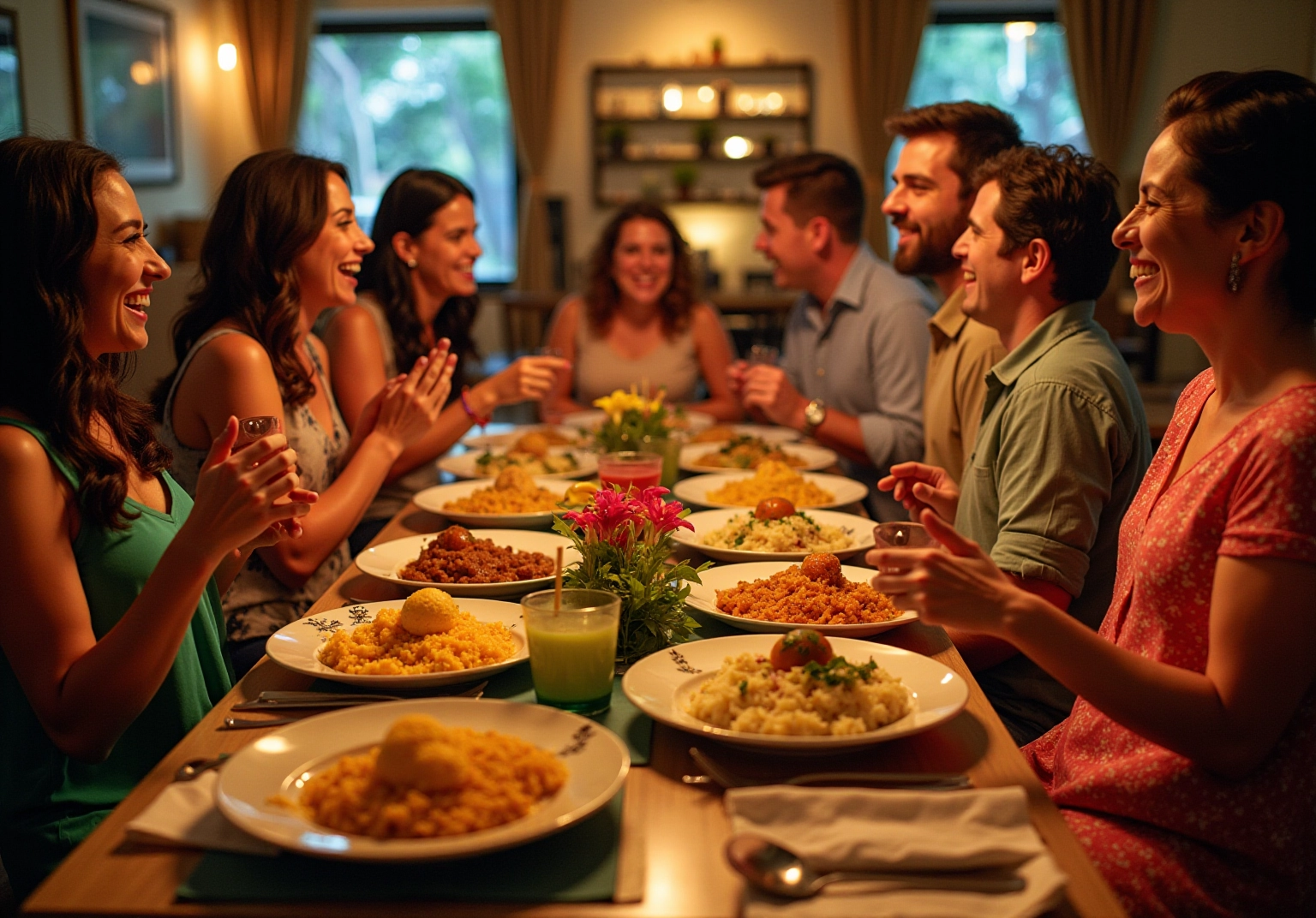
Llegué Tarde: The Puerto Rican Way of Being Fashionably Late
Llegué tarde’ translates to ‘I arrived late,’ and it’s often said with a smile, illustrating the charm of Puerto Rican phrases funny that reflect the islanders’ delightful tendency to be fashionably late.
Picture this: at social gatherings, it’s perfectly normal to arrive 30 minutes to an hour late, a notion echoed in many Puerto Rican phrases funny! The emphasis here is on savoring the company rather than strictly adhering to the clock. This laid-back approach creates a warm atmosphere, allowing for deeper connections and more enjoyable interactions.
Isn’t that a delightful way to connect?
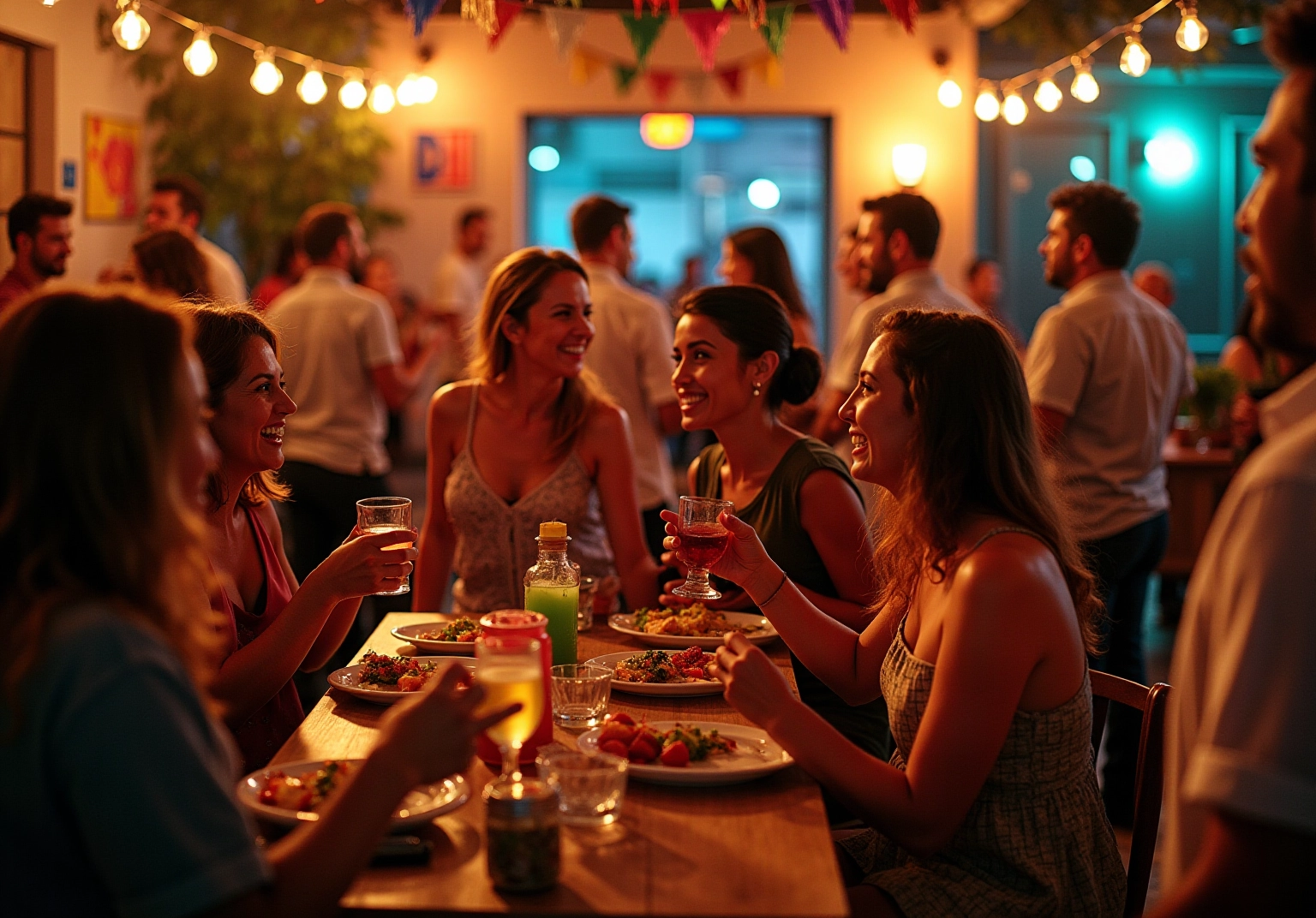
La Familia es Todo: The Importance of Family in Puerto Rican Life
La familia es todo’ translates to ‘The relatives are everything,’ and it beautifully captures the deep-rooted belief in the importance of kinship bonds within Rican culture.
Family gatherings? They’re not just common; they’re often large, vibrant events that truly reinforce the love and support among relatives!
Most residents of the island love celebrating important occasions like birthdays and weddings at home, which really emphasizes how vital these gatherings are in their lives.
The home acts as the heart of social life, where these celebrations unfold, reflecting the significance of familial unity.
This phrase highlights the shared identity that kinship nurtures, shaping individual experiences and values while fostering a strong sense of belonging.
In this Caribbean paradise, the focus on kin extends beyond just close relatives, embracing a wide network of extended relations that enriches the cultural fabric and community support system.
Plus, the cultural value of ‘dignidad’ (dignity) plays a crucial role in family relationships, underscoring the respect and obligations that strengthen these bonds.
Isn’t it fascinating how family ties can shape a culture so profoundly?
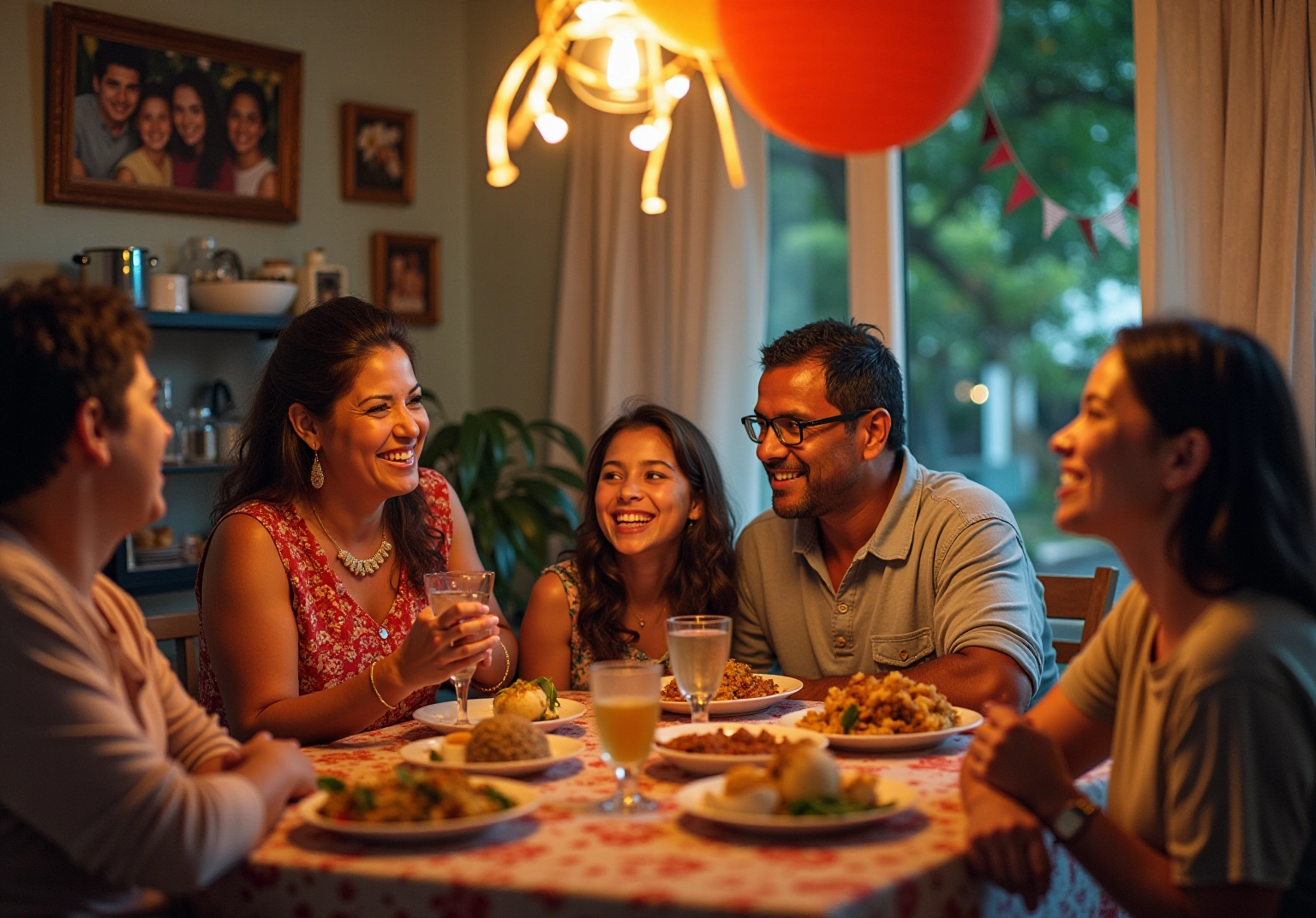
No Hay Problema: The Puerto Rican Approach to Life’s Hurdles
No hay problema’ translates to ‘No problem,’ and it’s a phrase you’ll often hear when challenges or requests arise. This simple expression captures the island’s spirit of resilience and adaptability. When faced with difficulties, the island’s residents frequently use this phrase to convey a sense of ease and readiness to tackle solutions. It really reinforces a positive, communal approach to navigating life’s hurdles. Isn’t it inspiring how such a small phrase can embody such a big attitude?
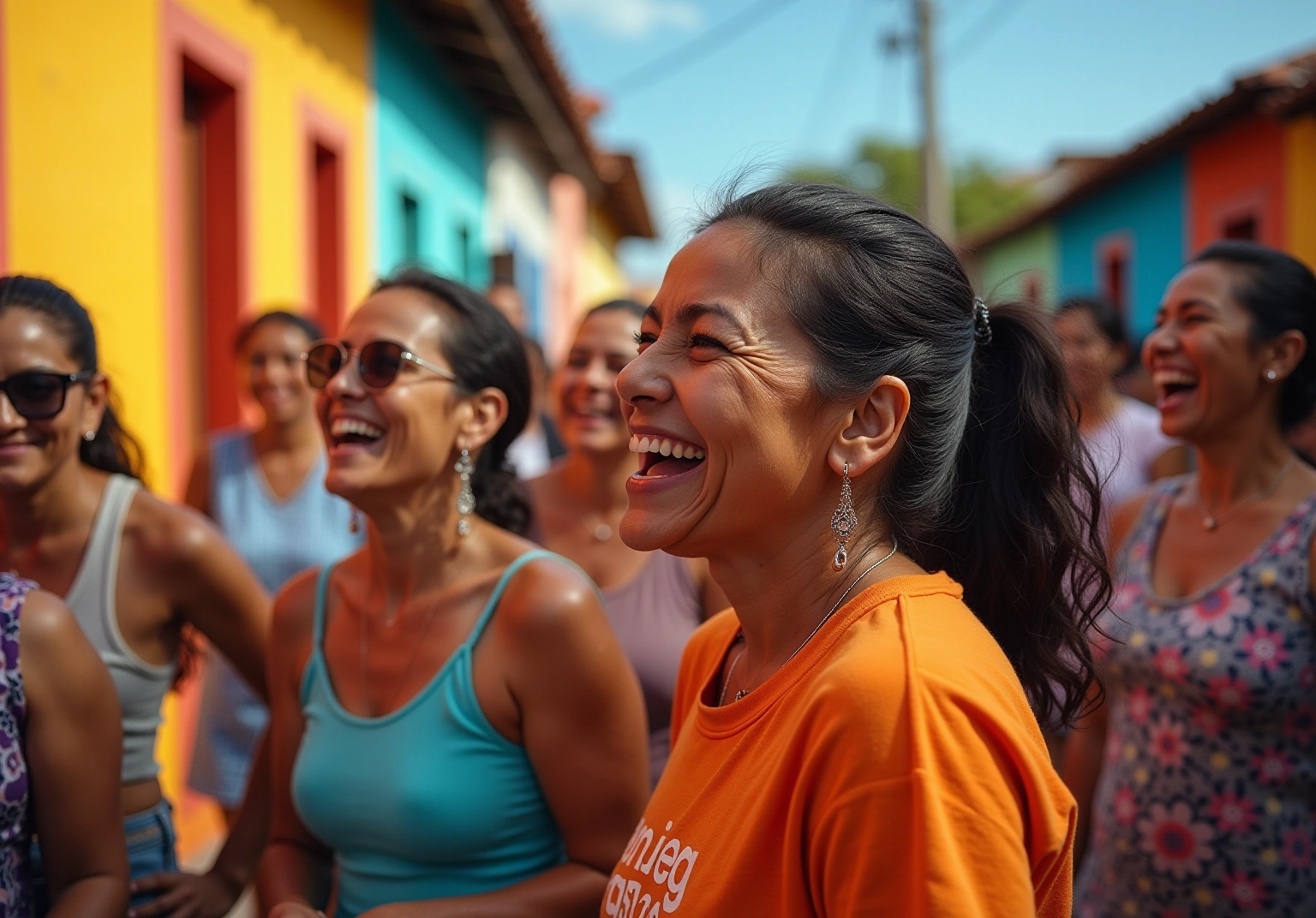
¿Y Tú Qué Sabes?: The Puerto Rican Way of Spreading Gossip
¿And what do you know? This phrase translates to ‘And what do you know?’ and is often the perfect way to kick off some gossip or a casual chat. It beautifully captures our love for storytelling and sharing the latest news—whether it’s about friends, family, or what’s happening around town.
You see, gossip isn’t just idle chatter; it’s a delightful way to connect with others, weaving a sense of community and shared experiences. So, the next time you hear this phrase, think of it as an invitation to dive into the stories that bind us together!
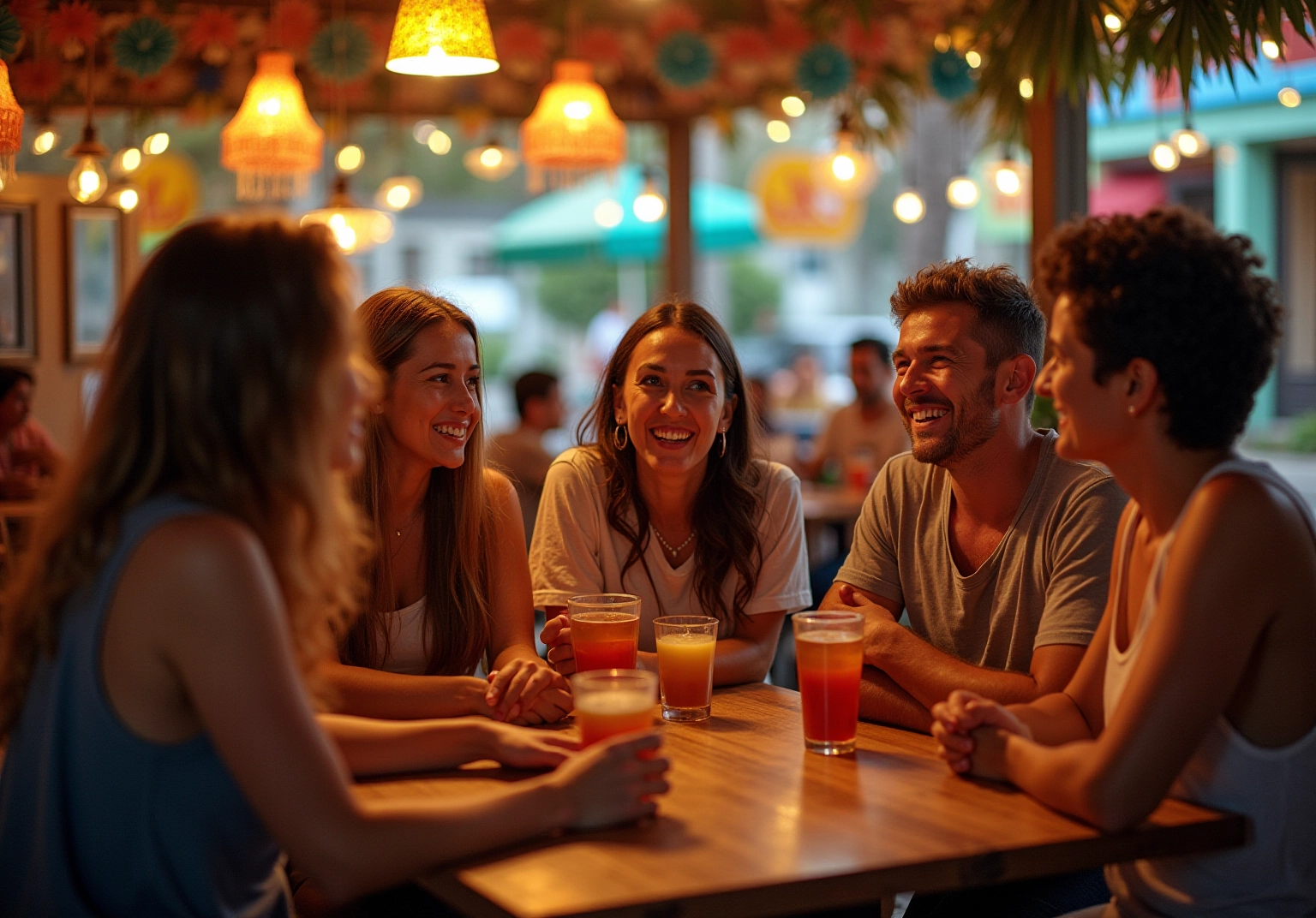
Fiesta Todo el Tiempo: The Puerto Rican Love for Parties
Fiesta todo el tiempo,’ which translates to ‘Party all the time,’ perfectly captures the vibrant spirit of celebration that residents of the island embrace. From birthdays to holidays and spontaneous gatherings, the essence of festivity is woven into their culture. This phrase reflects a shared belief that life is meant to be celebrated, nurturing joy and a strong sense of community.
Recent festivals, like the San Sebastián Street Festival and the Ponce Carnival, highlight this enthusiasm, inviting locals and visitors to join in on the lively music, dance, and culinary delights. In the Caribbean, parties aren’t just events; they embody a way of life, showcasing connection, joy, and the rich cultural heritage that defines the island.
Did you know that around 90 to 95 percent of the population in the Caribbean island values their citizenship? This statistic underscores the cultural pride that fuels these celebrations. As Bad Bunny wisely stated, ‘I reside in Rico, my family resides in Rico, my friends.’ What happens in Rico truly matters to me! This sentiment resonates deeply during festivities, where the historical significance of music, rooted in the Taino culture, plays a vital role in bringing people together and celebrating life.
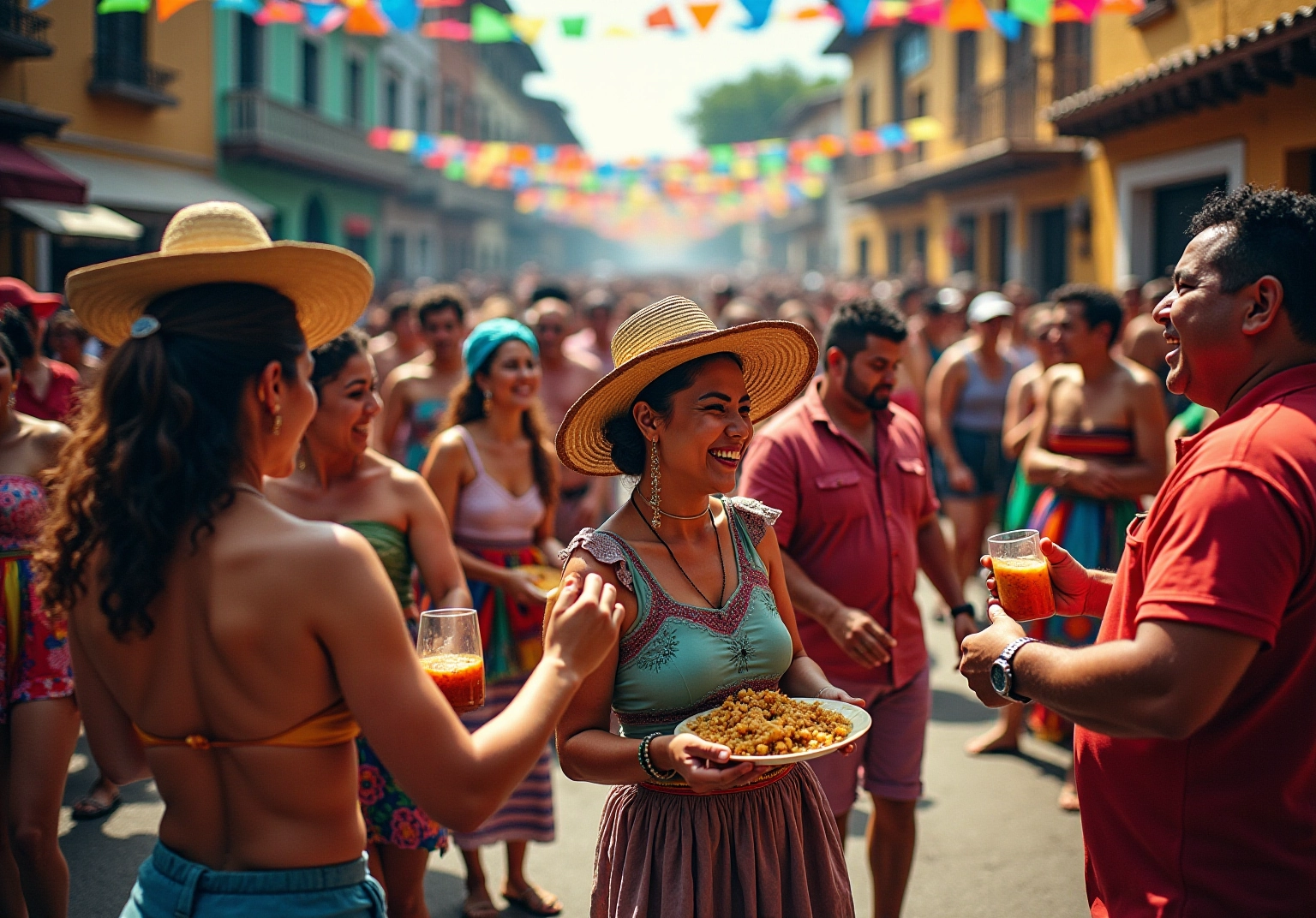
El Amor es Ciego: The Puerto Rican Take on Love
El amor es ciego’ translates to ‘Love is blind,’ and it humorously captures the irrationality often tied to love. This phrase suggests that when people are in love, they might overlook their partner’s imperfections. It’s a sentiment that resonates deeply in cultures where passion frequently overshadows practicality.
In Rican communities, love is celebrated with a vibrant mix of affection and humor, often reflected in Puerto Rican phrases, funny and local expressions. Experts like Dr. Frances Cohen highlight that this phrase serves as a playful reminder of the complexities of romantic relationships, where emotional ties can lead to overlooking flaws.
Additionally, a study by Bartels and Zeki at University College London reveals that maternal affection is also blind, fostering feelings of well-being. This aligns beautifully with the cultural understanding of love in the Caribbean. It emphasizes the importance of emotional connections, often placing feelings above logical considerations.
To navigate the ups and downs of love, islanders often embrace laughter through Puerto Rican phrases, funny and lightheartedness. It’s essential to appreciate the humor in relationships! For anyone looking to apply this understanding, think about how humor can ease tensions and foster deeper connections in your own romantic experiences.

Trabaja Duro, Pero Disfruta Más: The Balance of Work and Fun in Puerto Rico
Trabaja duro, pero disfruta más’ translates to ‘Work hard, but enjoy more.’ This delightful phrase, as well as other Puerto Rican phrases funny, captures the essence of Puerto Rican life, where balancing diligence with enjoyment is key.
Sure, hard work is important, but there’s a wonderful emphasis on carving out time for leisure and celebration!
Imagine a lifestyle bursting with vibrancy, where work serves as a stepping stone to savoring life rather than being the sole focus. Doesn’t that sound refreshing?
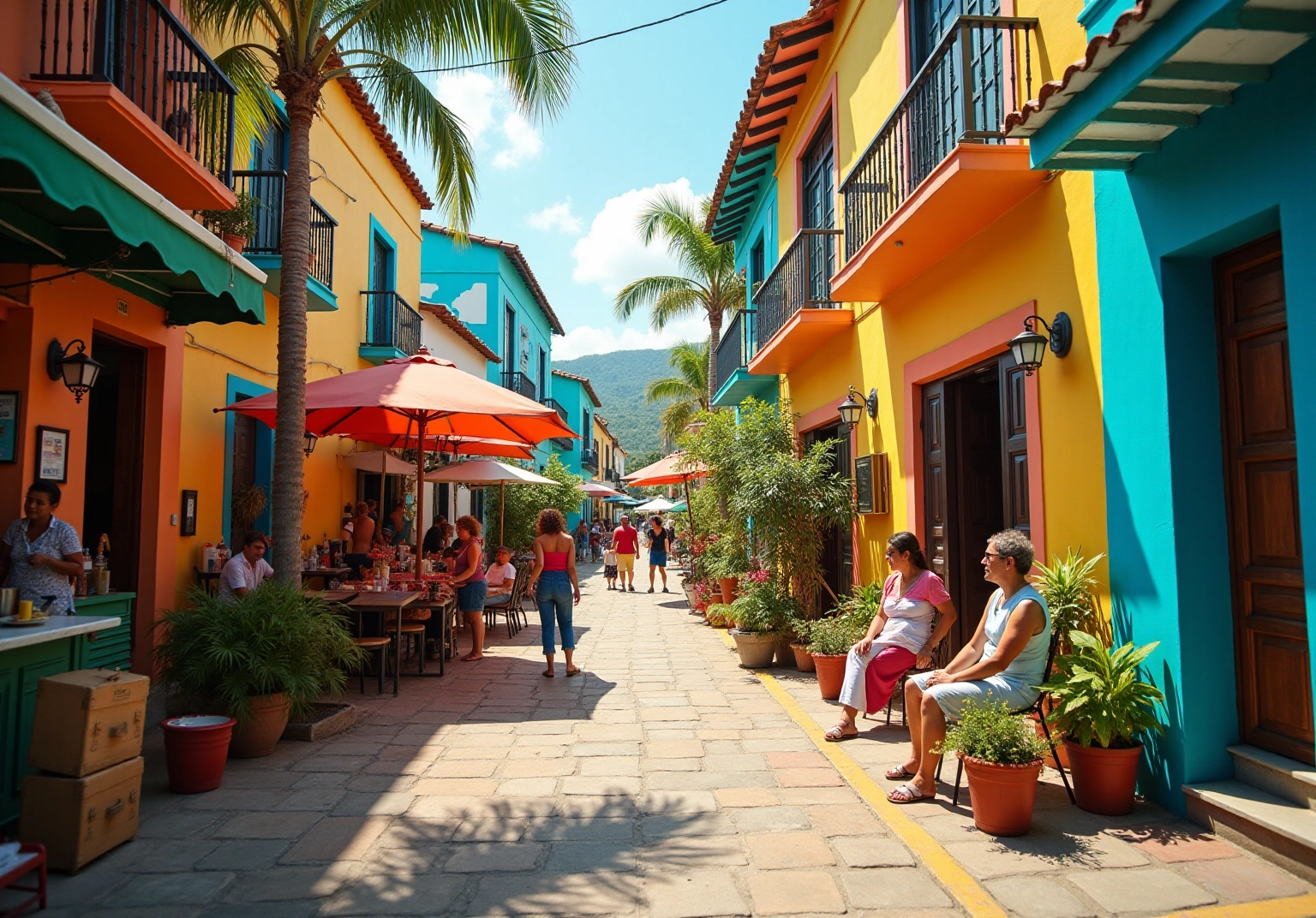
Conclusion
The vibrant tapestry of Puerto Rican culture is beautifully expressed through its unique phrases and sayings, each encapsulating a slice of island life. This exploration of humorous expressions not only highlights the joy and warmth of the Puerto Rican spirit but also serves as a reminder of the deep connections forged through language and shared experiences. Each phrase reflects a cultural value, from the importance of family to the joy of communal meals, showcasing how humor and tradition intertwine in everyday interactions.
Throughout the article, key phrases such as “¡Wepa!” and “La Familia es Todo” illustrate the exuberance and significance of relationships in Puerto Rican life. The playful nature of expressions like “No Hay Problema” and “El Amor es Ciego” further emphasizes a laid-back attitude toward challenges and the complexities of love. These insights reveal how language not only communicates feelings but also fosters a sense of belonging and community among islanders.
As the rich cultural heritage of Puerto Rico continues to thrive, embracing these expressions can deepen your appreciation for the island’s unique identity. Whether it’s sharing a meal or celebrating a fiesta, each phrase invites you to partake in the joy of connection. So, immerse yourself in this cultural humor, explore the meanings behind these sayings, and consider how they can inspire a more joyful and communal approach to life, no matter where you are.
Frequently Asked Questions
What does the expression “Wepa” mean in Puerto Rican culture?
“Wepa” is an exclamation used to express joy, excitement, or approval, often heard during celebrations, parties, or when good news is shared.
How is “Wepa” typically pronounced?
“Wepa” is pronounced with a distinctive, nasally tone that emphasizes the vowels, making it an infectious expression of joy.
In what contexts might you hear “Wepa” used?
You might hear “Wepa” during fiestas, celebrations, or any moments of happiness when people want to invite others to join in the fun.
What does “¡Ay, Dios Mío!” translate to, and what does it express?
“¡Ay, Dios Mío!” translates to “Oh my God!” and is used to convey surprise, disbelief, or sympathy.
How is “¡Ay, Dios Mío!” often accompanied when expressed?
This expression often comes with dramatic gestures, enhancing its emotional impact.
What does the phrase “Comer es un placer” mean, and what does it signify in Puerto Rican culture?
“Comer es un placer” means “Eating is a pleasure” and signifies the deep-rooted love for food in Puerto Rican culture, where meals are communal occasions that strengthen bonds among loved ones.
What role do communal meals play in Puerto Rican culture?
Communal meals symbolize unity and celebrate heritage, reflecting the belief that food fosters joy and strengthens relationships.
How are music and food connected in Puerto Rican gatherings?
Music and food are intertwined in Puerto Rican gatherings, creating unforgettable experiences that enhance the enjoyment of communal meals.
Can you give examples of traditional Puerto Rican dishes mentioned in the article?
Traditional Puerto Rican dishes mentioned include mofongo and arroz con gandules.
What cultural significance do communal meals have in Puerto Rico?
Communal meals are essential to Puerto Rican culture, reinforcing the idea that food is a vital part of the island’s identity and a way to celebrate heritage.









